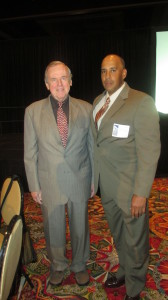
Since 1995, The Texas Defender Service (TDS) has sought to articulate the message that the criminal justice system in the second largest state in the nation should be fair and just. In addition, its mission is also to educate the public about the flaws in the Texas death penalty system.

At TDS Light of Justice Luncheon on Tuesday, October 28, 2014 at the Houston Hilton of Americas, the keynote guest speaker best-selling author, scholar and historian Thomas Cahill presented the issue of disparities in the criminal justice system and how these disparities begin at childhood.
Cahill opened his presentation with Biblical writings from the Apostle Paul’s first letter to the Corinthians. “When I was a child, I spoke like as a child. When I was a child, I thought like a child. When I became a man, I put away childish things. These were the words referenced by Barack Obama at his first inauguration,” Cahill said.
“Now imagine if your life as a child was one of sadness, deprivation, beatings, humiliation. How do you put away childish things if you haven’t had the chance to be a child? How do you become a man as the Paul says if you never had a chance to be a child? How do you grow up if you never had the chance to be a child?” asked Cahill.
“Every psychologist will say unless you have had the chance to be a child to play, to battle, to explore and to try things out while yielding parental admiration and love you cannot successfully negotiate the transition from a child to an adolescent; and from an adolescent to an adult and never become a genuine adult.”
Building on his theme, of childhood unfairness, cruelty and abuse, Cahill said that when parents take out their adult frustrations on the helpless body of a child with constant humiliation, beatings and even torture that most of these children will most likely face the law and sooner or later find themselves facing prison time. And he added that it is more prevalent for the males who come from abusive homes who experienced a healthy childhood to end in prison.
Cahill told the story of one of his friends, a respected journalist and writer. But a one time, the friend was a bank robber. Cahill’s friend eventually was caught and served some prison time. “My friend revealed to me recently that he never met a man in prison who was not beaten by his father, mother or abused or abandon,” said Cahill. His friend had lost his mother at a young age and the father had trouble coping with the lost took his frustrations out on his son by delivering terrible frequent beatings.
Equating the meanness and unfairness of such situations, Cahill said it is accepted by society because they are able to look beyond circumstances especially if someone is poor and black. To add validity to his assessment, Cahill pointed out that he doesn’t know one white wealthy man on deathrow. “The system doesn’t send people like me to deathrow. They send people who don’t look like them. It’s not that blacks commit more crime than whites. It’s that the courts sentence them because most don’t have good representation and because of their race,” said Cahill.
“It reminds you of a certain form of Calvinism which is really destructive. I think they are looking to kill people who are different from them inn many circumstances with retributive justice or punishing wrongdoers for violating the law. Texas is particularly afflicted with it. Let’s get them. Let’s get the people who are not us. Let’s get the others,” Cahill said.
Cahill told the story of another man, Dominique Green a former Texas Death Row inmate who he had grown close to while he was on deathrow. “Dominique was young, black and poor. Before he got on deathrow at 18, he was a petty drug pusher. He came from a family where his mother, a prostitute will discipline him by beating him and holding his hands over open flames until their burned. His father was a pimp and would also beat him. Dominique ended up living in a storage unit for three years from the age of 15. He was a schizophrenic even developed multiple personalities, said Cahill.
Green entered onto the Texas Deathrow in July of 1993 after he was convicted of robbing and shooting a man along with three other guys. Green admitted to being present at the scene of the murder, but claimed he was only the lookout guy and shot no one. One guy who partook in the crime was white. The grand jury No-Bill he while the other two black guys worked out prison plea deals.
Cahill met Green at the request of Judge Sheila Murphy who was working on the appeal of the case. Cahill said that he found a level of goodness and peace in Green.
“Through all that Dominique had been through he had blossomed into a beautiful human being. He became an advocate reader, student and an excellent writer. He was an expert on the legal system and helped other inmates with their cases. I don’t believe that he killed anyone” said Cahill.
Cahill even convinced Archbishop Desmond Tutu to come all the way from South Africa to the Walls Unit of the Texas Death Row to visit Green who had great admiration for the renowned social rights activist. Archbishop Tutu even pleaded for mercy for Green.
“Dominique was deeply impressed by Archbishop Desmond Tutu’s book, No Future Without Forgiveness. Dominique believed in forgiveness and encouraged others to forgive and asked for forgiveness and to drop all pettiness,” said Cahill.
On October 26, 2004, Dominique Green was executed by lethal injection. His final statement was: I am not angry, but I am disappointed that I was denied justice. But I am happy that I was afforded you all as family and friends. You all have been there for me; it’s a miracle. I love you…I am not as strong as I thought I was going to be. But I guess it only hurts for a little while. You all are my family. Please keep my memory alive.”
Cahill was so moved by Green’s plight and remarkable triumph while on deathrow that he wrote a book on Green’s story called A Saint on Death Row.
One of the Texas Defender Service core projects is the Policy Project which seeks to improve capital and indigent defense policy at the county and state levels through research and advocacy. In the past year, TDS has trained more than 2,500 capital defense team members.
